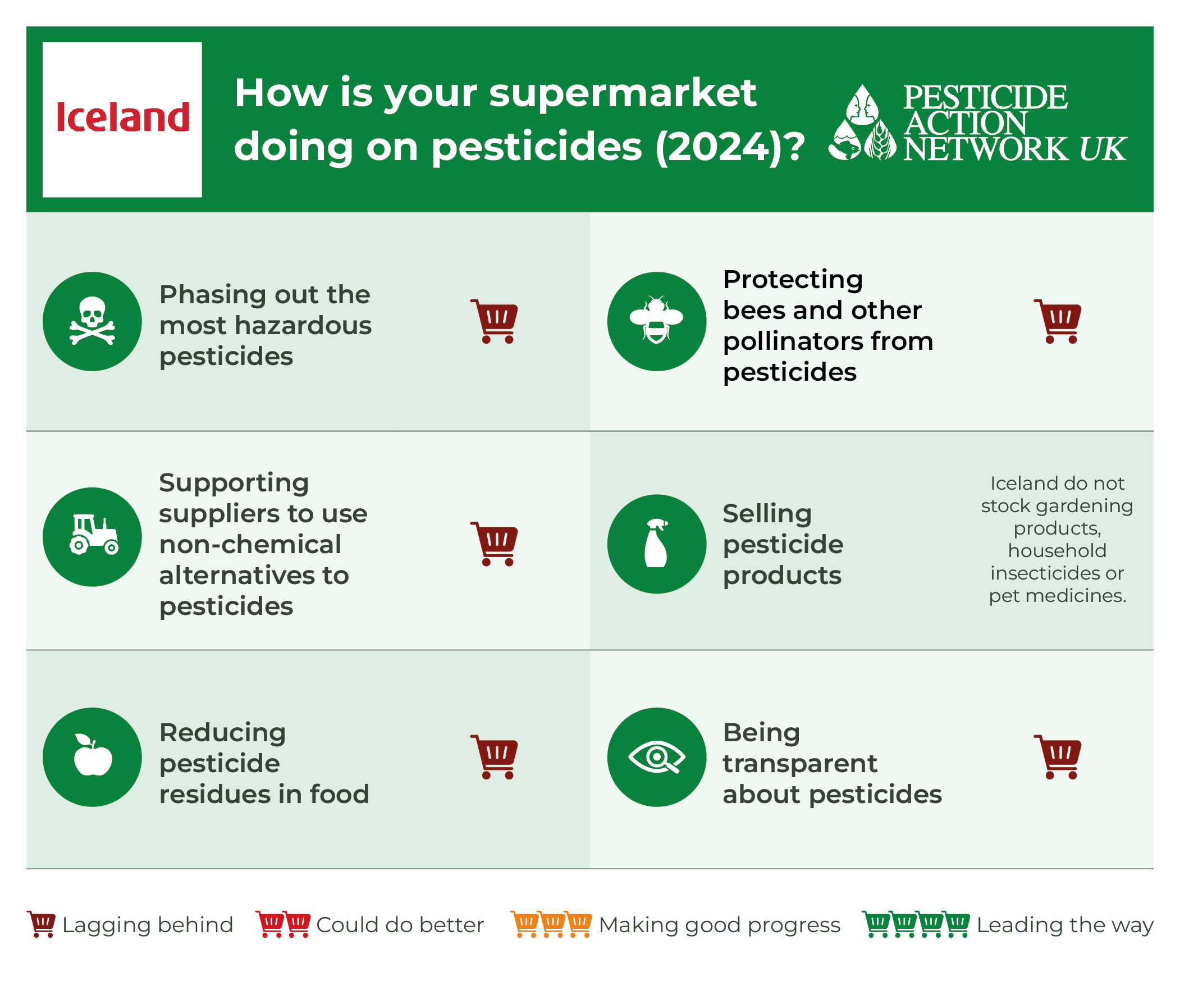Iceland
Iceland received a low overall score and came at the bottom of the 2024 supermarket ranking. The company’s position has not changed since the previous ranking in 2021. The company hasn’t made any major progress in the past three years and continues to lag behind other UK supermarkets in terms of protecting the health of consumers, agricultural workers and the environment from pesticides.

What is Iceland doing well?
Reducing pesticide residues in food
- Iceland tests fruit and vegetables, dairy products and fruit juice for pesticide residues. The company also tests frozen produce which is very important given that this makes up a large proportion of its sales.
- When Iceland detects food containing pesticide residues that exceed the legal safety limit, it works closely with the supplier to identify the root causes of the problem and agree an action plan for tackling it. The company also monitors the issue going forward and shares the associated learnings with other suppliers.
What are Iceland’s priority areas for improvement?
Phasing out Highly Hazardous Pesticides
- Iceland is the only major UK supermarket that does not have lists of pesticides which are monitored, restricted or banned from use in their supply chains due to their potential to cause harm. Instead, the company only takes action to remove a pesticide from its global supply chains if it has been banned by national regulators. In contrast, most other supermarkets have introduced restrictions on pesticides that go well beyond the national laws of the countries in which they operate.
Protecting farmworkers from pesticides
- Iceland has not introduced any measures designed to protect the health of agricultural workers using pesticides to produce the food that ends up on its shelves. Unlike some other supermarkets, the company does not require agricultural workers applying particularly toxic chemicals to adopt additional safety measures. It also doesn’t monitor pesticide poisonings of workers involved in its global supply chains.
Supporting suppliers to use non-chemical alternatives to pesticides
- The company needs to increase its support to its growers in both the UK and internationally to help them reduce their pesticide use and adopt non-chemical alternatives to pesticides. It should follow the example of many other supermarkets by providing training and guidance, establishing groups to bring their growers together for peer-to-peer learning, and funding research and trials into non-chemical alternatives.
Reducing pesticide residues in food
- Iceland only takes action to tackle residues in food when the amount of a pesticide detected reaches its legal safety limit. The majority of other supermarkets take action when their testing detects residues of less than the legal limit (some as low as 50%) and are therefore more stringent in protecting consumer health.
Protecting bees and other pollinators from pesticides
- Iceland needs to step up its efforts to protect bees and other pollinators, including phasing out the use of neonicotinoids and other bee-toxic chemicals in its supply chains and supporting its suppliers to monitor and better protect pollinator populations.
- Pesticides are still sprayed around Iceland stores. To help biodiversity flourish, the company should run trials of non-chemical alternatives, with the ultimate aim of going pesticide-free around all of its stores.
Being transparent about pesticides
- Iceland should follow the example of some other supermarkets by publishing its full pesticide policy and the lists of which pesticides it monitors, restricts or prohibits from its supply chains. The company should also publish three-years’ worth of detailed results from its residue testing programme so that its customers are able to see which pesticides appear in the food they buy.













